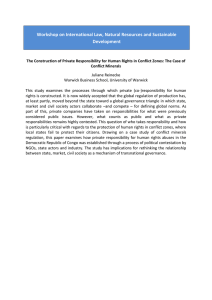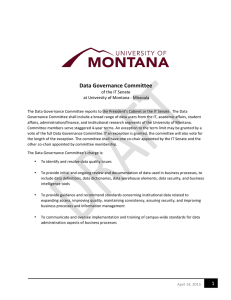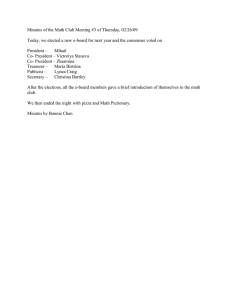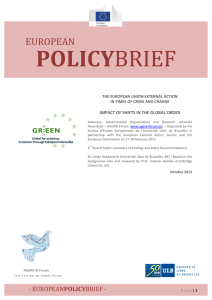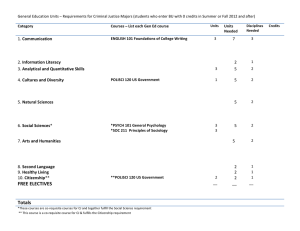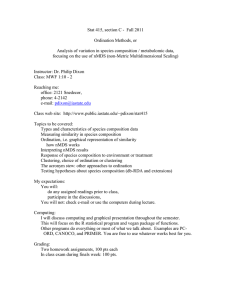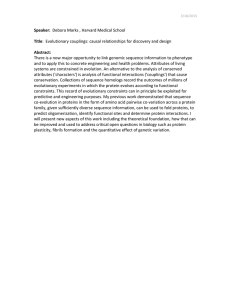Document 13092570
advertisement
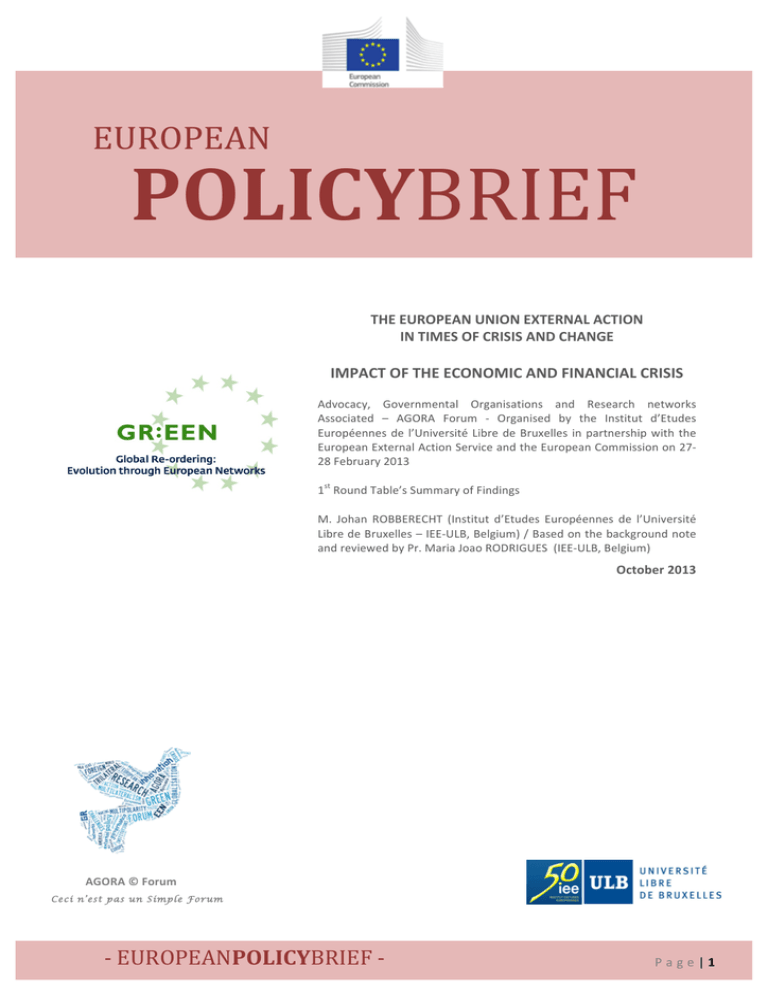
EUROPEAN POLICYBRIEF THE EUROPEAN UNION EXTERNAL ACTION IN TIMES OF CRISIS AND CHANGE IMPACT OF THE ECONOMIC AND FINANCIAL CRISIS Advocacy, Governmental Organisations and Research networks Associated – AGORA Forum -­‐ Organised by the Institut d’Etudes Européennes de l’Université Libre de Bruxelles in partnership with the European External Action Service and the European Commission on 27-­‐ 28 February 2013 st 1 Round Table’s Summary of Findings M. Johan ROBBERECHT (Institut d’Etudes Européennes de l’Université Libre de Bruxelles – IEE-­‐ULB, Belgium) / Based on the background note and reviewed by Pr. Maria Joao RODRIGUES (IEE-­‐ULB, Belgium) October 2013 AGORA © Forum Ceci n’est pas un Simple Forum -­‐ EUROPEANPOLICYBRIEF -­‐ P a g e | 1 INTRODUCTION The impact of the economic and financial crisis on the EU’s external action is still a very recent research topic. Moreover, such a study objective must necessarily integrate inputs from a wide range of disciplinary sources, as it copes with a moving target: an unprecedented and multidimensional crisis. Interestingly enough, two research blocks can be identified when it comes to the efforts deployed by researchers from all over the world seeking to analyse and better understand this crisis: (1) lessons drawn from historical parallels with the great depression of the late 20s; (2) policy and institutional implications of the crisis for the EU. With the Lisbon treaty ratified in 2009, a new framework was established for the EU’s external action. Central guidance was given to the European Council and a new post of HRVP of the European Commission was created, chairing the Foreign Affairs Council of Ministers. This was supported by a newly created European External Action Service (EEAS). Altogether it should have provided the EU with a comprehensive concept of external action. Yet, this new framework – perceived as one of the most relevant added values of the new EU treaty – became immediately severely tested, notably by the aforementioned crisis. Two main questions were consequently raised: (1) How the EU’s external action has responded to the crisis; (2) How has this crisis shaped the EU’s external action? SUMMARY OF THE RELATED RESEARCH TOPICS BORN FROM THE CRISIS 1° EU’s External Action • Implications of the Lisbon Treaty for the EU economic external action • Possible contribution of the EU’s external action to the resolution of the crisis • Global policy responses (notably with the creation of the G-­‐20 summits) 2° Understanding the crisis • Nature of the international financial and economic crisis, starting in 2007 • Transformation of the economic and financial crisis into a euro-­‐zone crisis • International impacts of the euro-­‐zone crisis • Implications of the crisis to re-­‐shaping global governance structures 3° EU Governance • Reforms introduced in the EU economic governance to cope with the crisis • Possible scenarios for the outcome of the euro-­‐zone crisis • Systemic reform to complete the EMU. E.g.: banking union, economic union, budgetary union and political union • Necessary transversal co-­‐ordination effort between European Policy areas • International comparisons of federalisation processes and of fiscal federalism -­‐ EUROPEANPOLICYBRIEF -­‐ P a g e | 2 ANALYSIS AND POLICY IMPLICATIONS A CRISIS CHARACTERISED BY TWO PERIODS The financial and economic crisis: 2008-­‐2010 • • • • EU played a central role in setting up the G-­‐20 (organisation, working methods and agenda setting) European Council improved its internal methodology: co-­‐ordination of the EU MS in some strategic issues of external action (G-­‐20 and key strategic partnerships) Better definition of the roles of the president of the Council, the president of the European Commission, and the HR/VP Setup of the EEAS: strengthened co-­‐ordination of the EU’s external policies in Brussels, with the member states, and in all capitals of the world. The Euro-­‐zone crisis: After 2010 • • • • • • Weakening of the EU’s focus on external challenges • Weakening of the EU’s resources for more consistent and coherent external action • EU emerges as one of the main concerns in the G-­‐20 process (risks of financial instability and double-­‐dip recession) • Reduction of the EU influence in the reform of the IMF-­‐WB governance • Reduction of the EU negotiation leverage / main strategic partners (countries and macro-­‐regions) Progress related to bilateral trade agreements or negotiations: one way of responding to the on-­‐going stalemate in WTO multilateral negotiations with the Doha Round EU started to become a source of global problems Reduction of trade opportunities in => Europe Damages the Reduction of EU flows of direct foreign potential of the investment EU’s external Creation of financial instability (turmoil in action the euro-­‐zone and risks of sovereign => default or bank bankruptcy) Political uncertainty about the capacity of the EU to solve its own problems • DEMOCRACY AND SUPRANATIONAL GOVERNANCE A central question of the crisis is: are we looking at the failure of the markets or of politics? A major challenge is that of the re-­‐appropriation of politics. The promotion of an effective and democratic political system is crucial. LACK OF CONVERGENCE IN THE EUROZONE Overcoming the Eurozone crisis with a credible solution is the key to restoring the EU’s international influence and the main sources of its power. The presence of a 2-­‐speed Europe should be considered in this regard: on the one hand the Eurozone and on the other the rest of the EU. AN IMPORTANT LINK BETWEEN INTERNAL POLICIES AND EXTERNAL ACTION The role of the EU as a transnational rule and standard setter (EU as regulatory power) has been minimally impacted by the crisis and is an area in which it still enjoys significant leverage. The biggest threat in this regard is to be seen in the contradictory efforts at reform of the EU’s internal modes of governance. -­‐ EUROPEANPOLICYBRIEF -­‐ P a g e | 3 In matters of industry, the potential of European SMEs as sophisticated service providers for large international firms across the world is currently being under-­‐estimated. The EU growth model does not target regulation in a sufficient way and tensions between opening up and nurturing small innovative firms lack in necessary assessment for better regulation. LACK OF CO-­‐ORDINATION A major issue in matters of co-­‐ordination is the relationship between the EEAS and the COUNCIL. Resources for a more consistent and effective foreign affairs, security and defence policy should be rationalised. If the European Semester represents a form of supranational macro-­‐economic governance, which cannot currently be achieved at the global level, a similar co-­‐ordination mechanism does not exist in the area of EU external action. Although striving towards a better co-­‐ordination of economic policies, the European semester remains imperfect. Respective role and targets of services remain partially defined. It also does not include either issues related to the EU’s external action or discussions on the EU budget devoted to any aspects of the EU’s external action. STRATEGIC PARTNERSHIPS WITH GLOBAL KEY-­‐PLAYERS REMAIN TOO SUPERFICIAL The EU-­‐US FTA is a major opportunity, but the difference in both partners’ power and nature needs to be taken into account. In contrast to the US, the EU is essentially a regulatory power, which implies that negotiations will essentially consist in arbitration between tariffs on the one side and regulations on the other. Moreover, unlike the EU, the US has an alternative trade negotiation perspective in the Pacific. US current capacity to attract investment has proven far more developed. It is of the upmost importance to avoid, that the EU-­‐US FTA would lead to a deregulation in Europe (towards the much more liberal model of the US). THE EU’s EXPERIENCE OF MULTILATERALISM: A MAJOR ADDED VALUE Tensions exist between the Westphalia system’s presence within multilateral fora and the complex multilateral decision-­‐making process of the EU. The EU has a unique experience to share in this regard. Multilateralism could become an aspirational model for international relations and contribute towards answering the challenges associated with the shift to a multipolar world. The diversity of economic competences, cultural background and international connections among EU member states should be promoted. Yet, if promoting a consistent preference for deepening multilateralism would be welcome, the challenge of the EU speaking out with one voice remains. More strategic co-­‐ordination between member states is therefore to be welcomed. Taking the example of the G20 – and bearing in mind that it is not a decision-­‐making body – the EU could become a driving force for the implementation of its strategic priorities: financial reform, sustainable growth, job creation, development support and global economic governance. But for this, a detailed, operational and sectoral approach needs to be worked out. -­‐ EUROPEANPOLICYBRIEF -­‐ P a g e | 4 RECOMMENDATIONS EU POLICY-­‐MAKING PHILOSOPHY • Cohesion underlies internal legitimacy, which is a basic of international credibility. The EU needs to revive the link between democratic debate (at national level) and EU policy-­‐making. Discussions, which are taking place at EU level, should trickle down and feed into major national debates. • The means and consistency between the European and national levels, as well as the EU’s policy coherence in key external policies, need to be strengthened notably in: (1) trade; (2) the single market: the EU’s strongest instrument to ensure it achieves its external goals; (3) development co-­‐ operation; (4) finance; (5) macro-­‐economic policy; (6) industrial policy; (7) energy; (8) research; (9) education; (10) employment and social policies. • The relationship between internal policies and the EU’s role as a transnational rule and standard setter should be acknowledged. ECONOMIC GOVERNANCE • The economic foundations of the EU’s growth model should be rethought so as to better target regulation. • To reach its full potential, the EU will need to prove its capacity to prompt economic convergence in the Eurozone, notably by completing the EMU. • The European Semester is to be reflected: (1) the role and targets of services should be better defined; (2) It should include issues relating to the EU’s external action; (3) It should include discussions on the EU budget, devoted to any aspects of the EU’s external action. EU-­‐US FTA • In order to foster better regulation, tensions between opening up (for example towards the US in the framework of the currently discussed EU/US FTA) and nurturing small innovative firms are to be better assessed. • In order to avoid this agreement leading to deregulation in Europe (towards the much more liberal model of the US), regulatory co-­‐ordination will have to precede policy area by policy area, sector specific and step-­‐by-­‐step. In this context, a major role for the EU’s external action is to defend the interests of European industries. THE EU IN MULTILATERAL FORA • A consistent preference for deepening multilateralism should be systematically promoted, even if this implies displaying debates and disagreements. Diversity should be acknowledged and promoted as a strength and not as a weakness. • The EU’s strategy should be re-­‐discussed involving member states. It needs to be clarified. • A Euro-­‐zone seat should be added to the IMF. -­‐ EUROPEANPOLICYBRIEF -­‐ P a g e | 5 PROJECT IDENTITY PROJECT NAME CO-­‐ORDINATOR CONSORTIUM Global Re-­‐ordering: Evolution through European Networks (GR:EEN). Professor Shaun Breslin, The University of Warwick, Coventry, United Kingdom. E: shaun.breslin@warwick.ac.uk Universiteit van Amsterdam Amsterdam, Netherlands Boston University Boston, United States of America Université Libre de Bruxelles Brussels, Belgium University of Cape Town Cape Town, South Africa Copenhagen Business School Copenhagen, Denmark Central European University Budapest, Hungary Facultad Latinoamericana de Ciencias Sociales Buenos Aires, Argentina FRIDE Madrid, Spain Istituto per gli Studi di Politica Internationale Milan, Italy Nanyang Technological University Singapore, Singapore Norwegian Institute of International Affairs Oslo, Norway Peking University Beijing, People’s Republic of China United Nations University-­‐ Comparative Regional Integration Studies Bruges, Belgium University of Western Australia Perth, Australia Waseda University Tokyo, Japan -­‐ EUROPEANPOLICYBRIEF -­‐ P a g e | 6 FUNDING SCHEME DURATION BUDGET WEBSITE FOR MORE INFORMATION FURTHER READING FP7 Framework Programme, Collaborative Project, SSH – Europe facing a rising multi-­‐ polar world March 2011-­‐ February 2015 (48 months) EU contribution: 7 944 718 €. www.greenfp7.eu Contact: General queries to green@warwick.ac.uk Contact: Project management matters to Laura Downey, L.Downey@warwick.ac.uk All working papers, policy briefing papers and other publications are available on our website: www.greenfp7.eu/papers -­‐ EUROPEANPOLICYBRIEF -­‐ P a g e | 7
